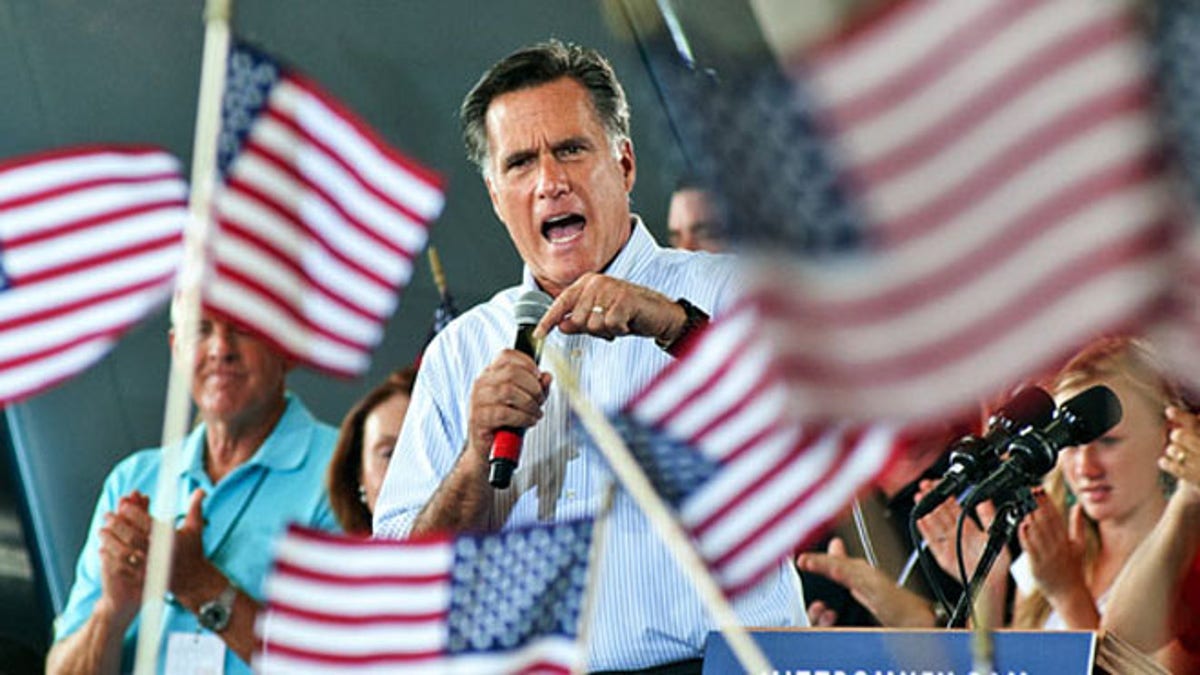
Mitt Romney speaks at a rally. (AP)
Washington – Republicans, after taking a drubbing in the 2012 election, are busy trying to get their digital act together.
By most accounts, the Democratic Party pushed their message harder, faster and more effectively than Republicans the last election cycle. With the sting of 2012 behind them and midterm elections around the corner, the GOP is racing to retool their online image and up their digital game.
“They need to start planning now to prepare for the future,” said Eric Frenchman, a strategist at Connell Donatelli Inc. “We had been looking to build offline media as a first line of defense. So we’ve been looking at TV, talk radio and even direct mail but we need to flip that model. It needs to be digital first.”
Republicans were outgunned when it came to online spending this past cycle. According to the Federal Election Commission, President Obama’s team dropped $52 million on digital media and advertising compared with Mitt Romney’s $26 million. Obama posted four times as much online content as Romney and was active on twice as many digital platforms, according to a Pew Internet & American Life study.
The digital power plays made by both sides this year mirrored what happened in 2008 when Sen. John McCain’s camp launched an 11th hour tech offensive that came too little, too late. Similarly, Romney advisers took aggressive steps this the summer to close their gap but were outmaneuvered.
Across platforms, Obama published 614 posts during a two-week period compared with Romney’s 168. The greatest contrast was on Twitter. Romney averaged one tweet per day while Obama had 29. Republicans were edged out on YouTube too. For every GOP video, Democrats put up two.
Hoping to avoid a three-peat, Republican strategists are taking aggressive steps to become more competitive.
Last week, members of the Republican Party as well as consultants from companies like Facebook and Twitter met in Washington to strategize on building a better platform. The group was led by Romney’s digital director Zac Moffatt, RNC digital director Tyler Brown and RNC Chief of Staff Jeff Larson.
Frenchman, who quarterbacked online advertising for the 2008 McCain-Palin presidential bid and attended the D.C. meeting, said it’s vital the party budget include enough money to compete with an already tech-savvy Democratic team.
“Spend money earlier in the process,” Frenchman said. “It’s not something you can afford to wait to finance. It’s going to take money and it needs to happen now.”
While working on the McCain-Palin campaign, Frenchman directed more than $175 million in online advertising on behalf of candidates, committees, corporations and ballot initiatives. He used online tools to generate donations and collect email addresses, but also to put out attack ads and talk about his candidates' positions on the issues.
The Republican Party's string of losses in the last election, though, showed how the GOP had taken a step back and highlighted cracks in their plan.
“This time around the Obama team was already in place,” Frenchman said. “They had a four-year head start. The way to fix this by addressing the situation early. Republicans need to grab all the tech people they can find and start working on a plan. They need to pool their resources and have a super RNC digital team.”
Some have criticized the Romney camp for wasting time trying to reinvent the digital wheel instead of building on foundations already in place. They were called out for being too slow to respond to developments in the race.
“When Romney really destroyed President Obama in the first debate, they had no changes to their website,” Frenchman said. And when Rep. Paul Ryan was added to the ticket, a Google search led viewers to an Obama campaign ad.
“The Romney spokespeople talked a big game and didn’t play it,” said Peter Pasi, a search specialist who worked on Sen. Rick Santorum’s presidential bid. “The Obama people played a big game and didn’t talk about it.”
Obama’s digital team used its web site, emails and text messages to push the president’s message. They also developed tools that made it easier to donate online, assemble groups to canvas neighborhoods and volunteer for field operations in swing states. They started a campaign that helped supporters find their Facebook friends in battleground states through an Obama 2012 app that also reminded them to vote. They then put a link on Facebook that helped supporters find voting locations.
For its part, the Romney campaign says it will hand over its digital files, which includes data on 1 million new voters, to the RNC.




